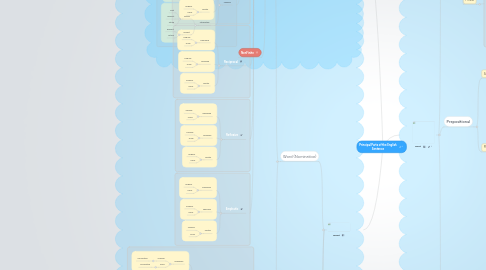
1. Predicate
1.1. Verb
1.1.1. Auxiliary (Helping, Linking)
1.1.1.1. Forms of be
1.1.1.1.1. am
1.1.1.1.2. is
1.1.1.1.3. are
1.1.1.1.4. was
1.1.1.1.5. were
1.1.1.1.6. been
1.1.1.1.7. being
1.1.1.1.8. be
1.1.2. Lexical (Main, Action)
1.1.2.1. Finite
1.1.2.1.1. Regular
1.1.2.1.2. Irregular
1.1.2.2. NonFinite
2. Subject
2.1. Word (Nominative)
2.1.1. Pronoun
2.1.1.1. Personal
2.1.1.1.1. Masculine
2.1.1.1.2. Feminine
2.1.1.1.3. Neuter
2.1.1.2. Demonstrative
2.1.1.2.1. Masculine
2.1.1.2.2. Feminine
2.1.1.2.3. Neuter
2.1.1.3. Interrogative
2.1.1.3.1. Masculine
2.1.1.3.2. Feminine
2.1.1.3.3. Neuter
2.1.1.4. Indefinite
2.1.1.4.1. Masculine
2.1.1.4.2. Feminine
2.1.1.4.3. Neuter
2.1.1.5. Possessive
2.1.1.5.1. Masculine
2.1.1.5.2. Feminine
2.1.1.5.3. Neuter
2.1.1.6. Reciprocal
2.1.1.6.1. Masculine
2.1.1.6.2. Feminine
2.1.1.6.3. Neuter
2.1.1.7. Reflexive
2.1.1.7.1. Masculine
2.1.1.7.2. Feminine
2.1.1.7.3. Neuter
2.1.1.8. Emphatic
2.1.1.8.1. Masculine
2.1.1.8.2. Feminine
2.1.1.8.3. Neuter
2.1.2. Noun
2.1.2.1. Proper (Michael, United Nations)
2.1.2.1.1. Masculine
2.1.2.1.2. Feminine
2.1.2.1.3. Neuter
2.1.2.2. Common (tower, water)
2.1.2.2.1. Abstract
2.1.2.2.2. Collective
2.1.2.2.3. Compound
2.1.2.2.4. Concrete
2.1.2.2.5. Non-countable
2.1.2.2.6. Gender-specific
2.1.2.2.7. Gerunds
2.2. sub-sentence
2.2.1. Substantive
2.2.1.1. Simple
2.2.1.1.1. Transitive
2.2.1.1.2. Intransitive
2.2.1.2. Complex
2.2.1.2.1. Transitive
2.2.1.2.2. Intransitive
2.3. Phrase
2.3.1. Substantive
2.3.1.1. Independent
2.3.1.1.1. Transitive
2.3.1.1.2. Intransitive
2.3.1.2. Infinitive
2.3.1.2.1. Transitive
2.3.1.2.2. Intransitive
2.3.1.3. Participle
2.3.1.3.1. Transitive
2.3.1.3.2. Intransitive
2.3.1.4. Predicative
2.3.1.4.1. Transitive
2.3.1.4.2. Intransitive
3. If Your Word is in the Subject of the Sentence it will fall under one of these categories....
4. If Your Word is in the Predicate of the Sentence then it falls under one of the following categories...
5. If it didn't then Your Word Must be an Object...
6. THE END - Hope You enjoyed this MindMeister Presentation!
7. Object
7.1. Direct
7.1.1. Word
7.1.1.1. Pronoun
7.1.1.1.1. Personal
7.1.1.1.2. Demonstrative
7.1.1.1.3. Interrogative
7.1.1.1.4. Indefinite
7.1.1.1.5. Possessive
7.1.1.1.6. Reciprocal
7.1.1.1.7. Reflexive
7.1.1.1.8. Emphatic
7.1.1.2. Noun
7.1.1.2.1. Proper (Michael, United Nations)
7.1.1.2.2. Common (tower, water)
7.1.2. Sentence
7.1.2.1. Substantive
7.1.2.1.1. Simple
7.1.2.1.2. Complex
7.1.3. Phrase
7.1.3.1. Substantive
7.1.3.1.1. Independent
7.1.3.1.2. Infinitive
7.1.3.1.3. Participle
7.1.3.1.4. Predicative
7.2. Prepositional
7.2.1. Sentence
7.2.1.1. Substantive
7.2.1.1.1. Simple
7.2.1.1.2. Complex
7.2.2. Phrase
7.2.2.1. Substantive
7.2.2.1.1. Independent
7.2.2.1.2. Infinitive
7.2.2.1.3. Participle
7.2.2.1.4. Predicative
7.3. Indirect
7.3.1. Word
7.3.1.1. Pronoun
7.3.1.1.1. Personal
7.3.1.1.2. Demonstrative
7.3.1.1.3. Interrogative
7.3.1.1.4. Indefinite
7.3.1.1.5. Possessive
7.3.1.1.6. Reciprocal
7.3.1.1.7. Reflexive
7.3.1.1.8. Emphatic
7.3.1.2. Noun
7.3.1.2.1. Proper (Michael, United Nations)
7.3.1.2.2. Common (tower, water)
7.3.2. Sentence
7.3.2.1. Substantive
7.3.2.1.1. Simple
7.3.2.1.2. Complex
7.3.3. Phrase
7.3.3.1. Substantive
7.3.3.1.1. Independent
7.3.3.1.2. Infinitive
7.3.3.1.3. Participle
7.3.3.1.4. Predicative
